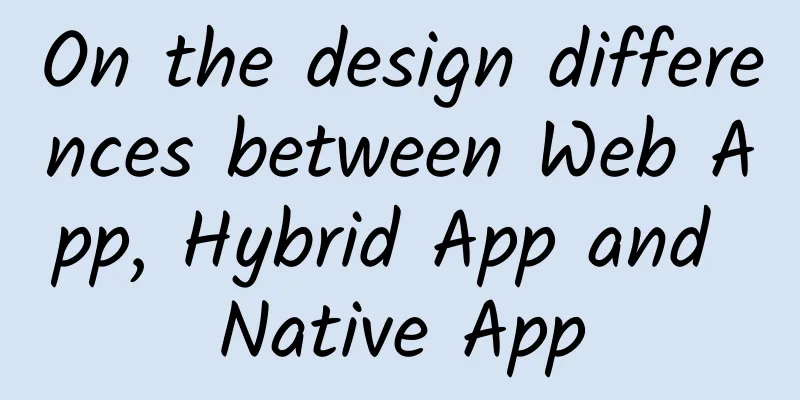On the design differences between Web App, Hybrid App and Native App

|
Currently, mainstream applications can be roughly divided into three categories: Web App, Hybrid App, and Native App. 1. Vertical comparison of Web App, Hybrid App and Native App First, let’s take a look at what Web App, Hybrid App, and Native App are. (1) Web APP Web App refers to an App written in Html5 language, which does not need to be downloaded and installed. It is similar to what we now call light applications. Applications that exist in browsers can basically be said to be touch-screen versions of web applications. advantage (1) Low development cost, (2) Fast update, (3) Updates do not require notification to users and do not require manual upgrades. (4) Able to work across multiple platforms and terminals. shortcoming: (1) Temporary entrance (2) Unable to obtain system-level notifications, reminders, animations, etc. (3) Low user retention rate (4) The design is subject to many restrictions (5) Poor experience (2) Hybrid App Hybrid APP refers to a hybrid app that is half native and half web. It needs to be downloaded and installed, and looks similar to Native App, but has only a few UI Web Views, and accesses the web content. For example, news apps and video apps in the Store generally use Native frameworks and Web content. Hybrid App tries its best to create an experience similar to Native App, but it is still limited by technology, network speed, and many other factors. It is not perfect yet. (3) Native App Native APP refers to a native program, which is generally based on the operating system, has strong interaction, is a complete App, and is highly scalable. Users need to download and install it for use. advantage: (1) Create the best user experience (2) Stable performance (3) Fast operation and smooth operation (4) Access local resources (address book, photo album) (5) Design excellent animations and transitions. (6) Have system-level thoughtful notifications or reminders (7) High user retention rate shortcoming: (1) High distribution cost (different platforms have different development languages and interface adaptations) (2) High maintenance cost (for example, an App has been updated to version V5, but some users are still using versions V2, V3, and V4, requiring more developers to maintain previous versions) (3) Updates are slow. Different platforms have different processes such as submission, review, and launch, which makes the process more complicated. 2. Technical Features of Web App, Hybrid App, and Native App As can be seen from the above figure, Web APP is developed based on Html5 language. However, Html5 language itself has inevitable limitations. It is precisely because of these limitations that Web App is inferior to Native App in experience. 3. Web App Restrictions and Design Points Compared with Native App, Web App experience is limited by the above five factors: network environment, rendering performance, platform characteristics, browser limitations, and system limitations. (1) Network environment and rendering performance Web APP is highly dependent on the network environment, because when users use the H5 page in the Web APP, they go to the server to request the page to be displayed. If the user happens to encounter other environments such as slow network speed and unstable network, the efficiency of the user's page request will be greatly reduced, and the user will experience unsmooth and intermittent use. At the same time, the rendering performance of H5 technology itself is weak: it does not support complex graphic styles, various animations, custom fonts, etc. Therefore, based on the influence of network environment and rendering performance, the following points should be noted when designing H5 pages: Simplify unimportant animations/motion effects Simplify complex graphic text styles Reduce the frequency and number of page renderings From the comparison between the mobile web version of jing.fm and the native version of jing in the figure below, we can see that the web APP homepage removes redundant functions and traces back to the origin, providing users with only the original essential needs of jing.fm - radio. This not only complies with the design principle of H5 to simplify functions but also achieves the design principle of highlighting core functions. It undoubtedly gives users a bright breath. As one of the core points in the book "The Beauty of Moments" says: What is important is not how much information we provide, but whether we can provide them with the information they really need. Another example: Baidu*** launched a direct number, taking Liangzi Fitness as an example: From the comparison between Native App and Web App (Baidu Direct Access), we can see that Native Liangzi is presented in the form of a nine-square grid, and has dual navigation, with too many function entrances; the disadvantage is that users don’t know where to focus, which distracts users’ attention. The Web version of Liangzi integrates and reduces the entrances of navigation, enhancing user concentration; the interface is refreshing and tidy, which well conveys the meaning of Liangzi itself - relaxed, pleasant, casual, and comfortable. (2) Limited by browser Usually Web App exists in the browser, and the host is the browser. Different browsers have different properties, such as browser-built-in gestures, page switching methods, link jump methods, version compatibility issues, etc. For example, the following figure: UC Browser and Baidu Browser support gesture switching. Slide the page from the left to return to the previous level. Baidu Mobile Assistant H5 page, the top banner supports gesture switching by sliding left and right. This operation conflicts with the browser's own gestures. For example, when a browser-based Web APP opens a page in a new module, it will usually open a new window to display it. For example, when a user uses a shopping APP and browses the daily selection module, a new window will be opened by default every time a new product is opened. The advantages and disadvantages of this are obvious: the advantage is that it can record the user's browsing traces and browsed products for subsequent horizontal comparison; the disadvantage is that too many pages can easily make users lost in the pages. As described in the Google development manual: When users open a Web App, they expect the app to be like a single app, not a combination of a series of web pages. However, when to jump to a page and when to display it on the current page requires careful consideration by designers. Therefore, based on the characteristics of the browser, Web App should follow the following two points from a design perspective: Use gestures sparingly to avoid conflicts with browser gestures Reduce the number of page jumps and try to display on the current page. (3) System limitations and platform characteristics Due to the technical characteristics of the Html5 language, system-level permissions cannot be called. For example, system-level pop-ups, system-level notifications, geographic information, address books, voice, etc. There will also be some compatibility issues with the system. The above limitations usually lead to weak scalability of the APP and relatively poor experience. For example, Baidu Maps: The web version of the map is displayed based on the browser, so it cannot display the map in full screen, which gives the user a sense of limitation; on the contrary, the native version of the map is displayed in full screen, which greatly expands the user's vision. The entire interface is clean and simple, and redundant functions are removed from the homepage. In the experience of making a route, as shown in the figure: The web version of the map consumes more traffic than the native version, and offline maps cannot be pre-cached. The determination of geographic location is also based on the host browser, not the web map itself. After obtaining the route, it is relatively inconvenient to change the way of arrival. On the contrary, the Native version of the map can directly access the user's geographic location, clearly show the route planned by the App to the user, and easily view multiple route options so that the best option can be made. Switching routes such as public transportation, walking, and driving only requires one click. Compared with the Web version of the map, the Native version of the map adds more emotional and easy-to-use functions, such as being able to record the user's life trajectory, record the user's footprints, and enjoy the congestion avoidance plan. The Web version of the map is based on a technical framework, and it is difficult to achieve the above functions. From the perspective of user experience, it is weaker than the Native version of the map. IV. Summary In summary, when designing a Web APP, the following points should be followed: (1) Simplification Simplify unimportant animations/motion effects Simplify complex graphic text styles (2) Use sparingly Use gestures sparingly to avoid conflicts with browser gestures Use fewer pop-ups (3) Reduction Reduce page content Reduce the number of controls Reduce the number of page jumps and try to display on the current page (4) Enhancement Enhance the fun of loading Enhance the primary and secondary relationship of pages Enhance control reusability ***: The editor recommends a group of excellent Web APPs to everyone forecast.io/ m.ftchinese.com/phone.html thenextweb.com jing.fm yuedu.fm mail.google.com plus.google.com snowbird.com everthing.me m.vancl.com pattern.dk/sun/ Please indicate the source as "Baidu MUX" when reprinting |
<<: Tencent Big Data: 2014 Q3 Mobile Industry Data Report
>>: Android 5.1 release date and new features revealed
Recommend
The Summer Palace (Hao Lei) Baidu cloud download, The Summer Palace Hao Lei high definition and uncut!
The film tells the story of the love-hate entangl...
Wang Daheng: Founder of New China's Optical Industry | Childhood of the Hero of "Two Bombs and One Satellite"
Wang Daheng, the founder of New China's optic...
Douyin SEO ranking rules and operation procedures
In the first half of this year, ByteDance CEO Zha...
If you are in a hurry, please take the stairs! It is not a good habit to walk on the left and stand on the right when taking the escalator →
Review expert: Wang Shengwei, Senior Engineer, Be...
With a low budget and high bid, how can you play Baidu bidding promotion?
Recently, I have sorted out several of the most f...
The shortcut from a novice to an expert in SEM bidding, you will regret it if you don’t read it!
The growth path of SEMer is a process of fighting...
Analysis of Weibo Fanstong advertising in Q2 2020
According to data from the 2019 Weibo V Influence...
Why do short video platforms need to conduct matrix operations?
Now many popular short video accounts have starte...
Why are mobile phones getting more expensive?
I think the reasons can be roughly divided into t...
I'm so hungry! There are so many "food easter eggs" in "Nezha 2" →
After the movie "Nezha: The Devil Boy Conque...
There are so many online advertising channels, how do you choose the platform that suits you?
Preface: Some of the friends who read this articl...
Momo information flow advertising types and promotion effects!
When we open the Momo app, we can see some advert...
China Constipation Day丨10 suggestions for people with constipation, have a happy poop, just follow them!
Today is also China Constipation Day ! In order t...
Do you want to know more about the "TikTok recommendation algorithm" that is said to be magical?
600,000 followers gained in 5 days. Understanding...
How to spend the May Day holiday? Many places advocate taking local holidays during the epidemic. Please keep the travel safety tips →
According to the Notice of the General Office of ...









